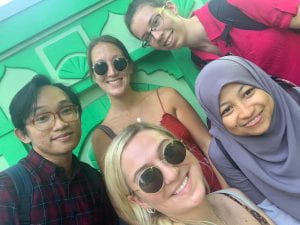My STEP Signature Project was a 24-day OSU faculty-led education abroad program titled Indonesia: Tourism, Culture and Local Community. While abroad, I attended workshops on the impacts of tourism, visited popular tourist destinations, relaxed on the beaches of Bali, and explored the backstreets with Indonesian college students.
During my STEP Signature Project, I learned that I am a serious over-packer! I brought more sunscreen, bug spray, and clothes than I could possibly use, along with hiking boots and water-shoes (which I could easily have done without!). I also became better at enjoying the moment. At home, I tend to focus on school and my career plans rather than going out with my friends or pampering myself. In Bali, almost everything you do is treating yourself, either with a spa day, gelato, or a walk on the beach. It is impossible to focus on work when you are in such a breath-taking place. Furthermore, my view toward world religions was broadened by the trip. As a Christian in America, the only information I knew about Hinduism and Buddhism came from a brief middle school education program. Being able to learn about those religions first-hand by watching or talking with members helped me understand Hinduism and Buddhism more deeply and compare them to Christianity.
On a deeper level, some of my assumptions about the world were broken during my education abroad program. For example, my view towards developing nations changed during the program: I saw wealthy Indonesian manors, poor shacks, huge shopping malls, and traditional rice paddy farmers. I interacted with Indonesian college students who had smartphones and social media accounts, “Googled” things, and worked to pay for college loans. These sights showed me that just because Indonesia is a developing country, it does not mean that the people there are stuck in the past without modern technology. People all across the globe are connected and share a globalized culture! This insight makes the world seem a lot smaller, since most people you meet will understand the Internet, cell phones, and modern plumbing.
One of the main events that led to my transformation was a workshop with students from Gadjah Mada University. Part of our day-long workshop was walking around the backstreets of Yogyakarta to explore non-tourist areas. When planning our trip, myself and a few other Ohio State University students talked with and got to know two GMU students named Fitri and Matteas. This was the first up-close and meaningful interaction I had with local Indonesians. I did a double-take the first time I heard Fitri say “I’ll Google it”; it seemed like such an “American” saying that I was stunned hearing it from her. On second thought, it makes sense that if they have internet, they have Google in Indonesia! Matteas also gave us his Snapchat and Instagram information so we could stay in touch. People in developing countries can behave more “developed” and modern than Western culture!
Another key event was our day around Yogyakarta touring the Buddhist Borobudur Temple and the Hindu Prambanan Temple. Our guide at those places, a local Hindu practitioner, described the core beliefs of each and interpreted how the architecture of the temples reflected those beliefs. The weathered stone and grand structures were awe-inspiring, especially considering they were built around 500 years ago. Visiting these temples and learning their history showed me that Christianity, Buddhism, and Hinduism share a common purpose: to guide their worshipers between right and wrong in order to prepare them for a better afterlife. My view of world religions was broadened. There is not necessarily one “right” religion, each religion can be “right” as long as it helps people live better lives on this earth and comfort them about the next life.
One last transformational activity was visiting the Monkey Forest in Ubud. There were hundreds of monkeys on the property, and they were free to climb the fence and leave anytime. I was expecting a poorly-kept property with a few monkeys trapped in enclosures, but I was happily wrong! The place was very modern and well-kept, and it even had a clinic in case anyone was injured by the monkeys. Furthermore, the monkeys there are vaccinated every three months for rabies and other diseases, and whenever one passes away, it is autopsied to ensure they (and the tourists) are safe. Again, this showed me that I should not judge people prematurely.
This personal transformation is significant because I have a more open and understanding view of world religions and cultures. I am not as prone to judge people based on stereotypes, as I have seen some of those stereotypes broken. Also, I have more appreciation for having fun and not worrying about the future all the time. Being more open-minded and present in each moment will help me live a better, more accepting life. Indonesia’s country motto, Unity in Diversity, summarizes my transformation fairly well because I need to embrace diverse people, cultures, and experiences to live the best life I can.
I studied tourism and its impact on the local community, culture, and environment in Indonesia. We discussed what tourists want and how attractions provide those experiences. We toured an ecotourism village in Central Bali, which showcased that tourism can be sustainable for the local economy, culture, and environment. These experiences will be valuable in my hopeful career as a park ranger, as I will be managing tourists and will need to limit their impact on the park environment and the local community. Due to all of the first-hand experiences I had interacting with locals, overcoming a language barrier, and learning about tourism and religions, this international experience will be an asset to my resume and increase my chances at obtaining a job as a park ranger.



